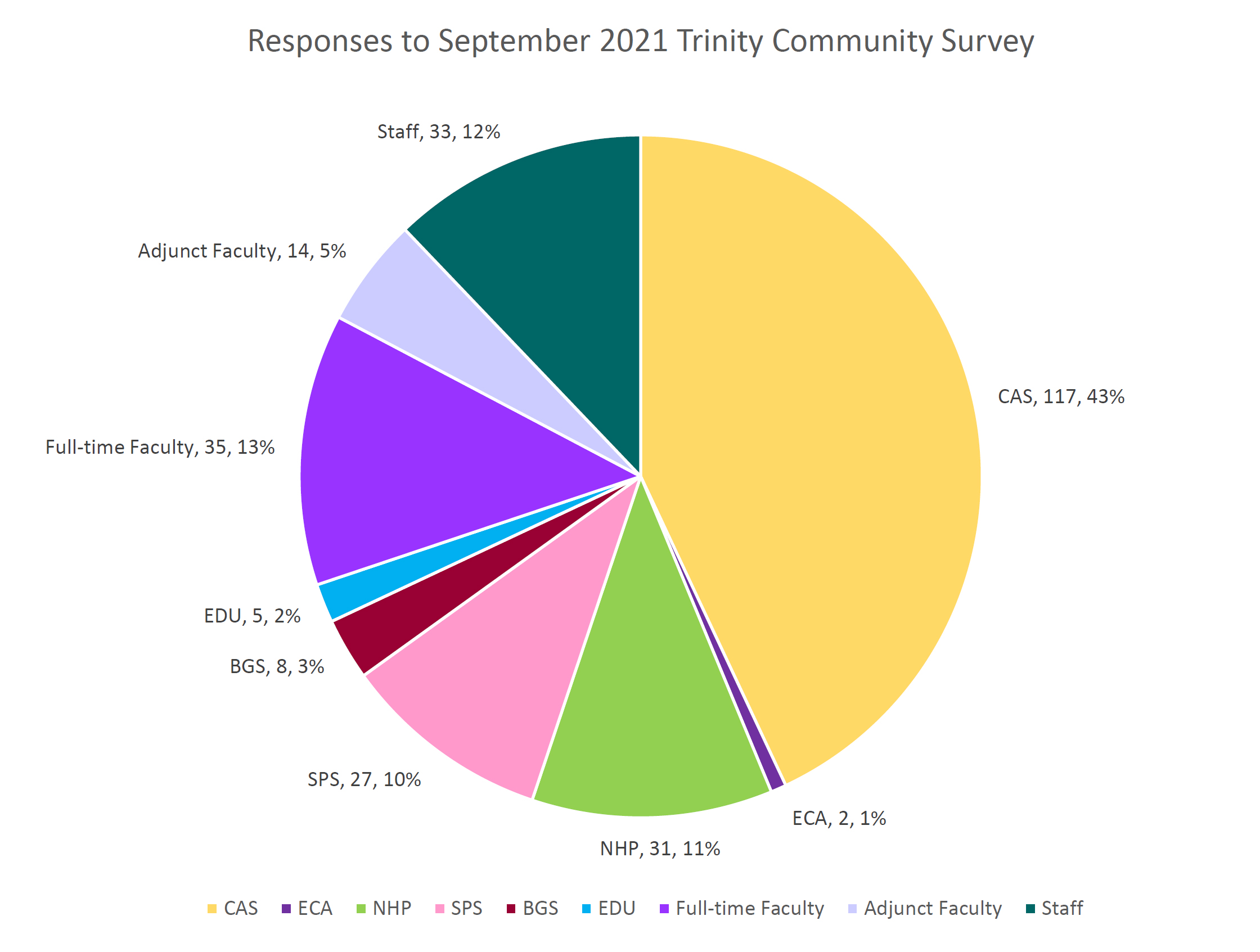
September 2021 Community Survey Results

We conducted a survey at the end of the first month of return-to-campus in September 2021. Thanks to 272 members of the Trinity community who responded! Your input is extremely valuable. The breakdown of the participation is in the graphic above.
We will discuss the results of this survey and also the parking/transportation survey on Thursday, September 30 at 4 pm on zoom as we resume “Campus Conversations” — please join us then! The zoom link has gone out on email.
Q2: How is the fall semester going?
Our first question asked respondents to tell us about how the Fall 2021 semester is going in general: Is the Fall 2021 semester going the same, better or worse than expected? Here are the results broken out by students, faculty and staff:
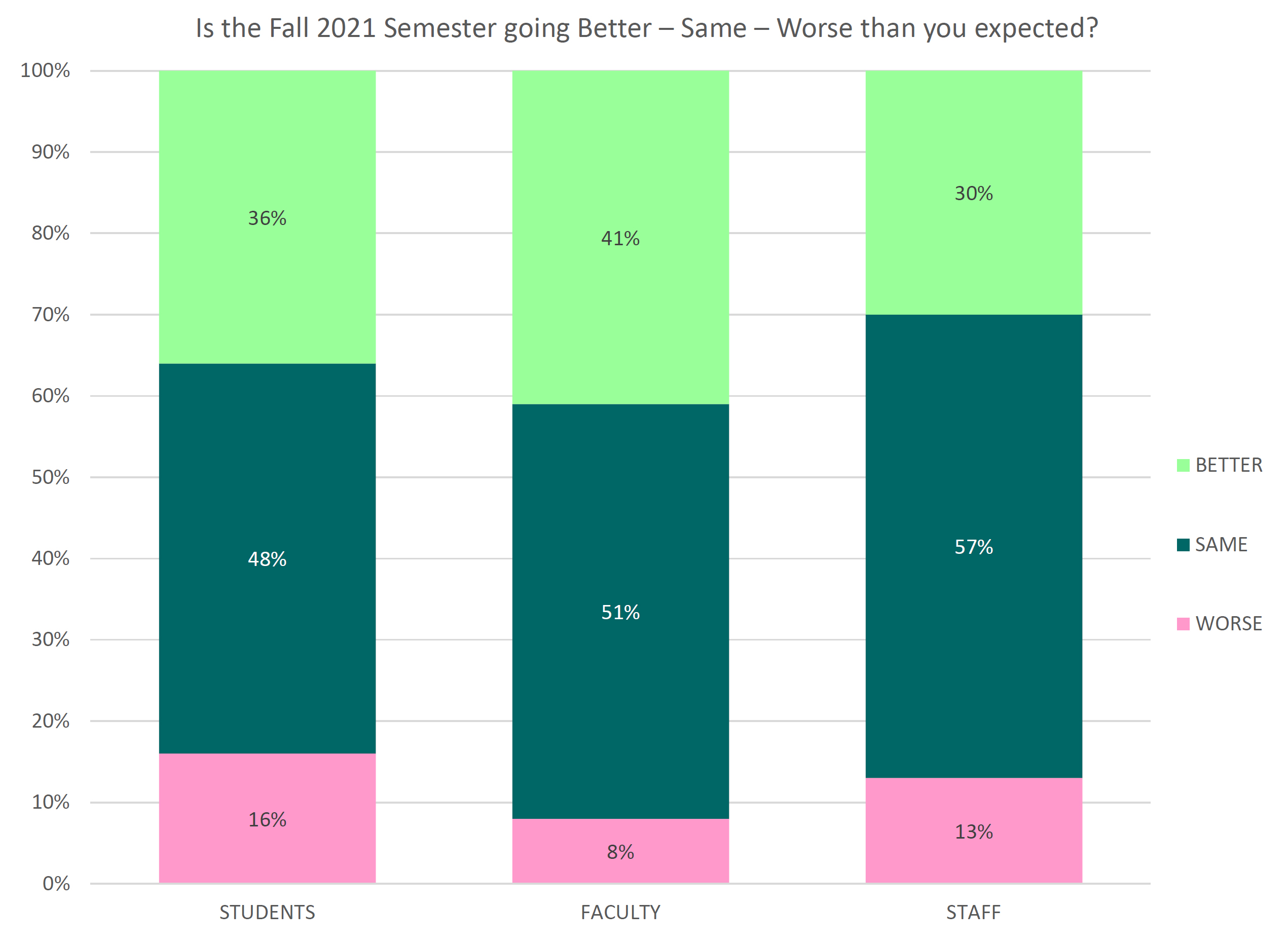
For most respondents, the semester seems to be going well. But students had more concerns than the faculty and staff. Some of the comments that accompanied the question are revealing:
Some CAS student comments:
“I am really enjoying my classes and having on-campus experience. It’s good to be able to see new faces. I feel safe in the environment that I am in.”
“I was excited about finally being in person but I think not being used to being in school for almost 2 years has made it exhausting. Virtual allowed me to be more prepared and better at knowing the content. My inperson classes are very quiet and more lecture and it’s a bit
draining.”
“It’s overwhelming, I think since we’re in person people are forgetting we’re in a pandemic. Professors are giving more work than usual and half of the students that attend Trinity are working to take care of themselves or family. Now I feel like mentally and physically I’m drained.”
“Professors are giving too much work.”
Some comments from graduate students in NHP:
“The pace of study and assignments are on par with what I expected. I am thoroughly enjoying the course content and interactions with professors. The overall organization of Moodle is at times confusing. Ocassionally, due dates and assignment postings on Moodle are incongruent with teacher’s syllabus. This causes some excess stress and confusion and detracts from study time.”
“Although I have been given resources to help me. I don’t feel supported in my work. I am only given negative feedback from one of my professors, which does not motivate me to want to move forward, but to quit. It seems that if it’s this hard out the gate, then I won’t be able to
finish.”
“I feel like professors are putting forth their best effort and still attempting to show grace when necessary.”
Some comments from students in PGS (SPS, BGS, EDU):
“I really enjoy my professors and their ability to connect with us. They make learning fun and give us space to speak our minds and truths!”
“I was intimidated by taking Business Law and Statistics at the same time, but each class is going well so far and I am excited about all I am learning!”
“When I saw that Moodle was going to be used, I was worried. However, the work submission process is going well. As well, being online is not as exhausting as I thought it would be. We are still able to have discussions and the class seems a bit more interactive. There is also a
great convenience to being online, the greatest being that after wearing a mask for nine hours at work, we don’t have to wear one for 4 more hours on a Friday night. My professors are doing a great job of communicating so I really have nothing bad to say!”
Some comments from faculty:
“All of the students in my classes seem engaged and happy to be back in person, although I am hearing a bit about traffic issues and workload.”
“It has been adjustment for students and for faculty to adjust to in person learning . Yet students are prepared, bringing computers to classroom to access their online work, seem more organized & very familiar with meeting deadlines on Moodle. Students report being
exhausted from adjusting to commuting.”
“Out of all the semesters I have taught at Trinity I feel the least prepared for this one. For every plan I have to have backup plans for when students or myself are out sick, out taking care of sick family members, having doctor appointments, or waiting for Covid test results. I am very happy to be back in person, and would rather be in person than online, but this semester is much more work than a typical in-person semester.”
Some staff comments:
“The return to fully in person instruction has been overwhelming. I do not know if I forgot what the pace of work prior to the pandemic was like or if it truly is more intense. I am glad that students are engaged and eager to learn but I feel a strain trying to keep pace with students’
needs and requests.
I know that the school has taken precautions concerning covid safety and making sure the correct information about anything related to covid was and is available to all the Trinity community. I also saw how hard my colleagues work in ensuring that the students had a
prompt response to their questions and concerns. I expected the start of fall’21 to be a good start and I believe that we will continue to have a good semester. Of course, there will always be issues to fix but that is common for all semesters.
Q3: Tell Us A Few Things About Yourself
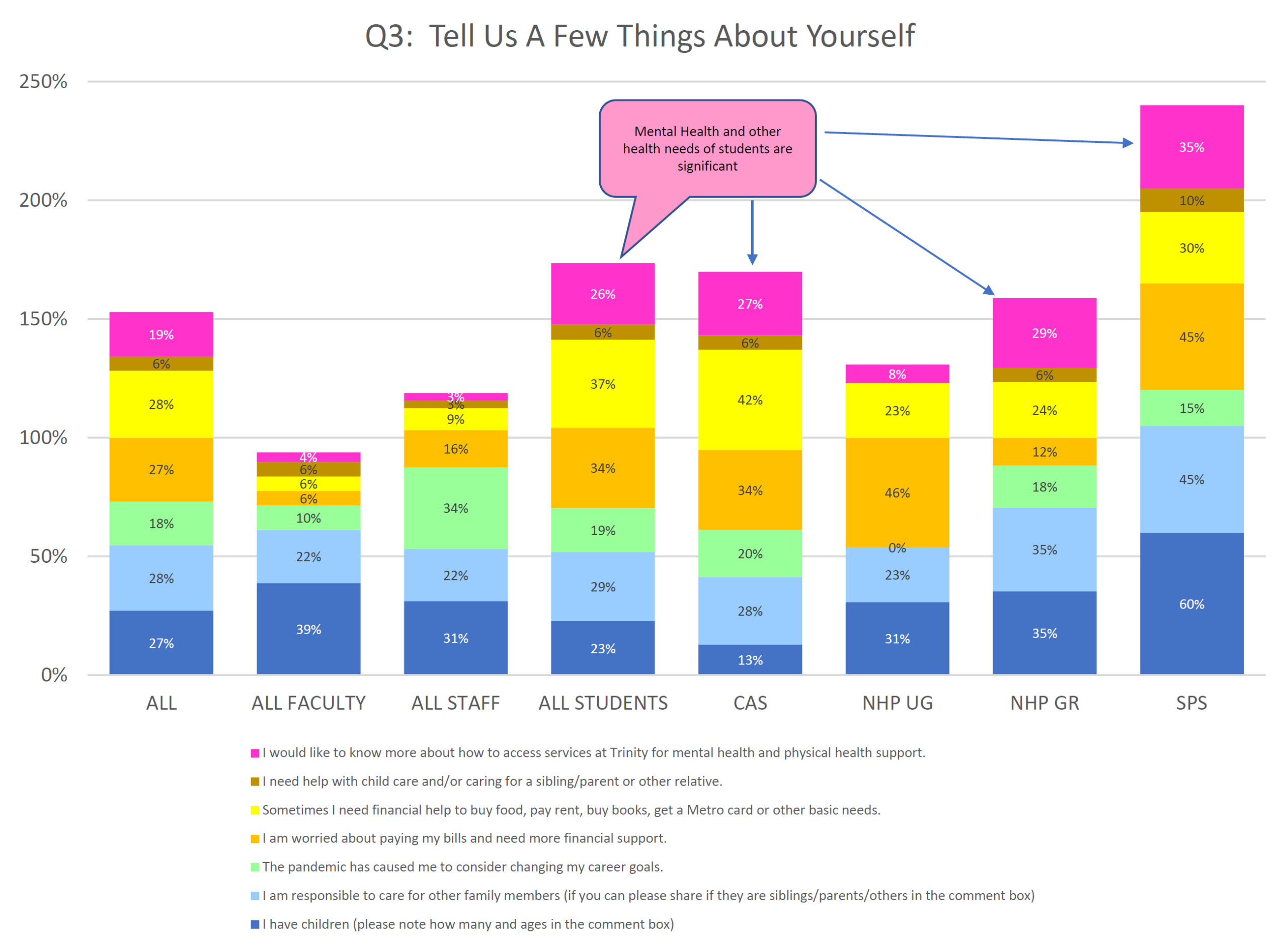
We know that the pandemic has been an immensely stressful time for everyone. The results of this survey tell us that students need more support for mental health and physical health than ever before. We are working to expand Campus Health Services supports and will be communicating more about that in the days ahead.
We also know, and see in the survey results, that students, faculty and staff are all caring for family members to a great extent — not only children, but siblings, elder or sick parents, grandparents, other relatives. Family care is a major source of stress and also financial concern.
Financial concerns are huge issues for Trinity students, confirmed in the survey results. 42% of CAS students have worries about basic needs like food, books, transportation, other essentials. Other student populations have similar needs.
Trinity supports students with financial concerns in a number of ways:
- Through the federal CARES Act/ARP program, we have distributed more than $4 million in direct emergency grants to students, and an additional $2.3 million in balance paydowns. We continue to make these grants to students this year, but the funds will expire at the end of the academic year. What this program has illustrated clearly is the need for additional federal financial aid for our students! Congress needs to stop playing partisan games and get moving on Doubling Pell and taking other actions that will help college students to stay in school and succeed academically! More on this later in October.
- Thanks to some exceptionally generous private benefactors, Trinity also has private emergency funds to help students with extraordinary needs. Each year Trinity awards more than $100,000 in emergency grants from these funds.
- Trinity also maintains a food pantry and other emergency help like Metro cards and references to external services for family issues, legal issues and domestic violence concerns.
Dr. Karen Gerlach, Vice President for Student Affairs, administers the emergency grant programs, and Dean Michele Bowie administers the food pantry and other support services. More information is available on the website about how to access these emergency services.
Q4: Evaluation of Services
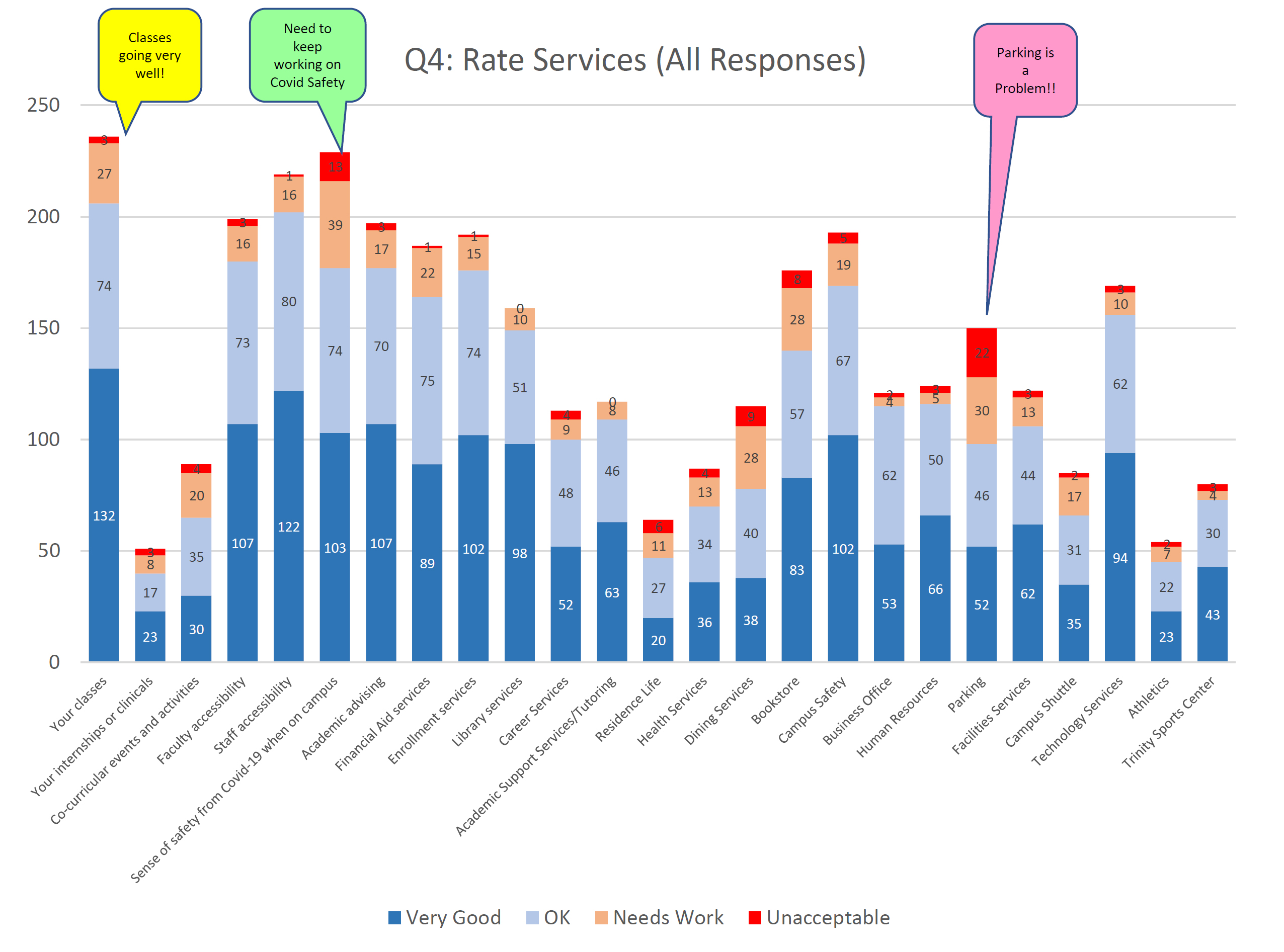
We asked you to rate campus services based on your experience during the first month of school. The above ratings reflect all 278 respondents, we have detailed data by cohort group (students, faculty, staff, etc.) but for this report the aggregate data seems useful.
The good news is that, in general, classes are going well!!
The other good news — depending on your perspective — is that the biggest problem is parking!! No, I’m not being cavalier about this (see below) but the fact that we are back on campus with crowded parking lots is such a joyful problem to have after the long months of emptiness and isolation the pandemic. We count the blessings we have.
More on parking below, but let me address a few other issues:
- Some students expressed concern about the volume of assignments — a familiar problem from last year as well — and the academic deans have all of the detailed responses broken out by cohort and will take up the issues with the faculty as appropriate.
- Concerns about Covid-19 remain on everyone’s mind, and I addressed some of this in a general message to the campus community recently. In short, with a 93% vaccine rate for everyone on campus, and indoor masking throughout, we are operating at maximum safety levels. We have air purifiers in classrooms and gathering spaces, and our Facilities team is working hard on cleaning continuously. For those very few constituents who still need to get vaccinated, we will be doing individual outreach and counseling in the next several weeks — unvaccinated persons are the major reason why the pandemic is not yet over, and we all have to help convince our friends and colleagues to do the right thing and get vaccinated for the sake of community health as well as their own!
- We have a very low rate of Covid positives among members of the Trinity community — just 15 positive cases since August, with 13 of those occurring in persons who have been off-campus the entire time, and 2 cases among students who immediately isolated in Kerby Hall and are now cleared. Those two cases occurred off-campus before school began, and the tests required at the start of school revealed the cases. I will continue to report on cases in my frequent weekly campus messages.
- Dr. Gerlach will follow-up with resident students about a number of concerns residents expressed in the survey about facilities, dining services and also —- visitation! We will be announcing a solution for visitation very soon… stay tuned!
Parking, Campus Shuttle and Transportation Survey
I will return to other topics covered in the September Community Survey in a future blog, but the comments about parking were so numerous and urgent that the topic bears addressing right here. We created a second survey that we are still analyzing, so these are preliminary results.
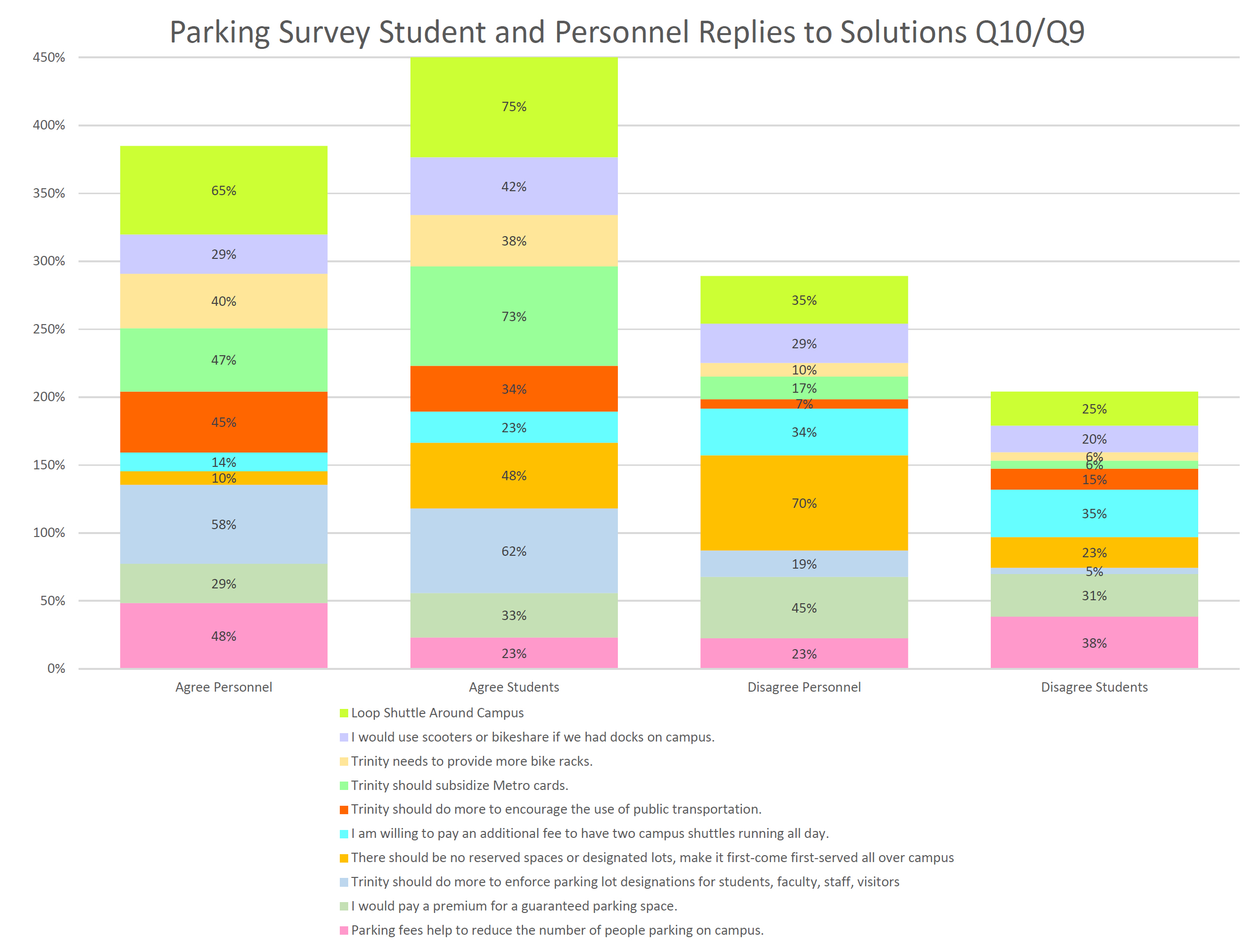
Skipping immediately to the very last question about solutions, we have considered various options and will be taking these actions in the next week or two as possible:
1. We will resume the shuttle loop around campus — a considerable number of the survey respondents, above, seemed to think this is a good idea (see the lime green bar on top of the columns) — the shuttle loop has these advantages: students can ride from the Metro to the Payden Center without having to get off at the loading dock and walk through Main Hall to get there; students and others who park in the Cuvilly parking lot can get the shuttle at the stop there to go over to Payden or Alumnae Hall; after class, students who ride Metro can get the shuttle directly in front of Payden to go back to Metro. The campus loop adds about 10 minutes to the shuttle schedule, meaning the shuttle runs about every 30 minutes. We will be posting a new shuttle schedule later this week, and also, the website shuttle tracker is now working properly so you can follow it on your smartphones!
2. We did not impose parking fees this semester because of the pandemic, and the combination of free parking and students wanting to avoid Metro probably has caused the significant increase in the number of students parking in the 9 am to 11 am time zone. We will not re-impose the fees right now, but are considering ways to encourage everyone to resume using more public transportation options.
3. We will republish and clarify the designation of parking areas for all constituents, and we ask everyone to cooperate with those designations. With the campus shuttle loop, parking should be easier if you can also get a ride to your destination.
4. We will also clean-up and re-stripe the parking lots where there are issues with the size of spaces and other concerns.
5. We will assess whether we can get a bike and scooter dock on or near campus for those who want to use them, and we will also take a look at where we need to add more bike racks.
6. Alas, we cannot add parking spaces — our zoning order limits campus parking to 420 spaces. So we have to work with what the city has already approved. The city does not like adding parking spaces because it’s the official policy of the city to reduce private automobiles and encourage public transportation.
7. For that reason — and also for cost reasons — we cannot build a parking garage. Parking costs about $21,000 per space to build, with average garage costs topping nearly $10 million. So, that’s not on the agenda any time soon.
8. Metro cards — cost is also an issue here. Some students mentioned the “free” Metro cards available to K-12 students (subsidized by the city), and also some local universities have Metro card programs. But what most do not know is that those university programs are subsidized through hefty fees assessed to all students regardless of whether they ride Metro. We looked into the programs and we’d have to assess every student a fee in excess of $100 to be able to participate in the program. Our evaluation is that we do not want to impose more fees on students, we are trying to reduce fees! Plus, we do not want to have fees assessed on students who will not use the service. So, that’s the explanation. We will keep looking at other options for this, and right now, we do have emergency funds and emergency Metro cards available for those who may need them.
We are taking a look at other options, and giving consideration to where students, faculty and staff live. The survey provided this interesting picture:
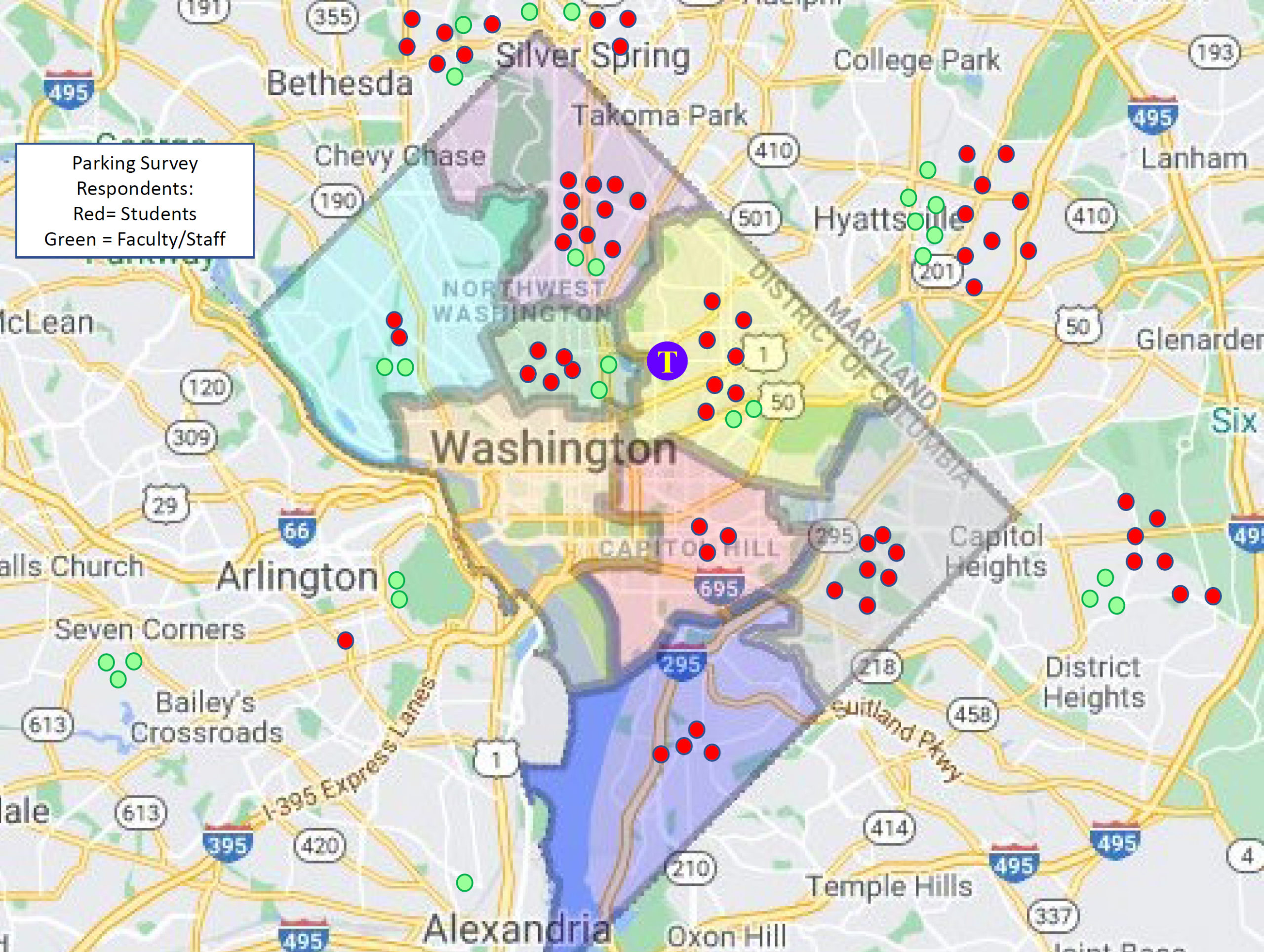
Most of our students commute from the eastern side of the city and out into Maryland. Staff are more diffuse but more likely to be north and west. Understanding residential and transportation patterns is part of our analysis of how to provide better services both on campus, and perhaps more online services as well.
While the map above was from the voluntary responses to our parking survey, the picture is consistent with our more complete residential data based on student enrollment this fall:
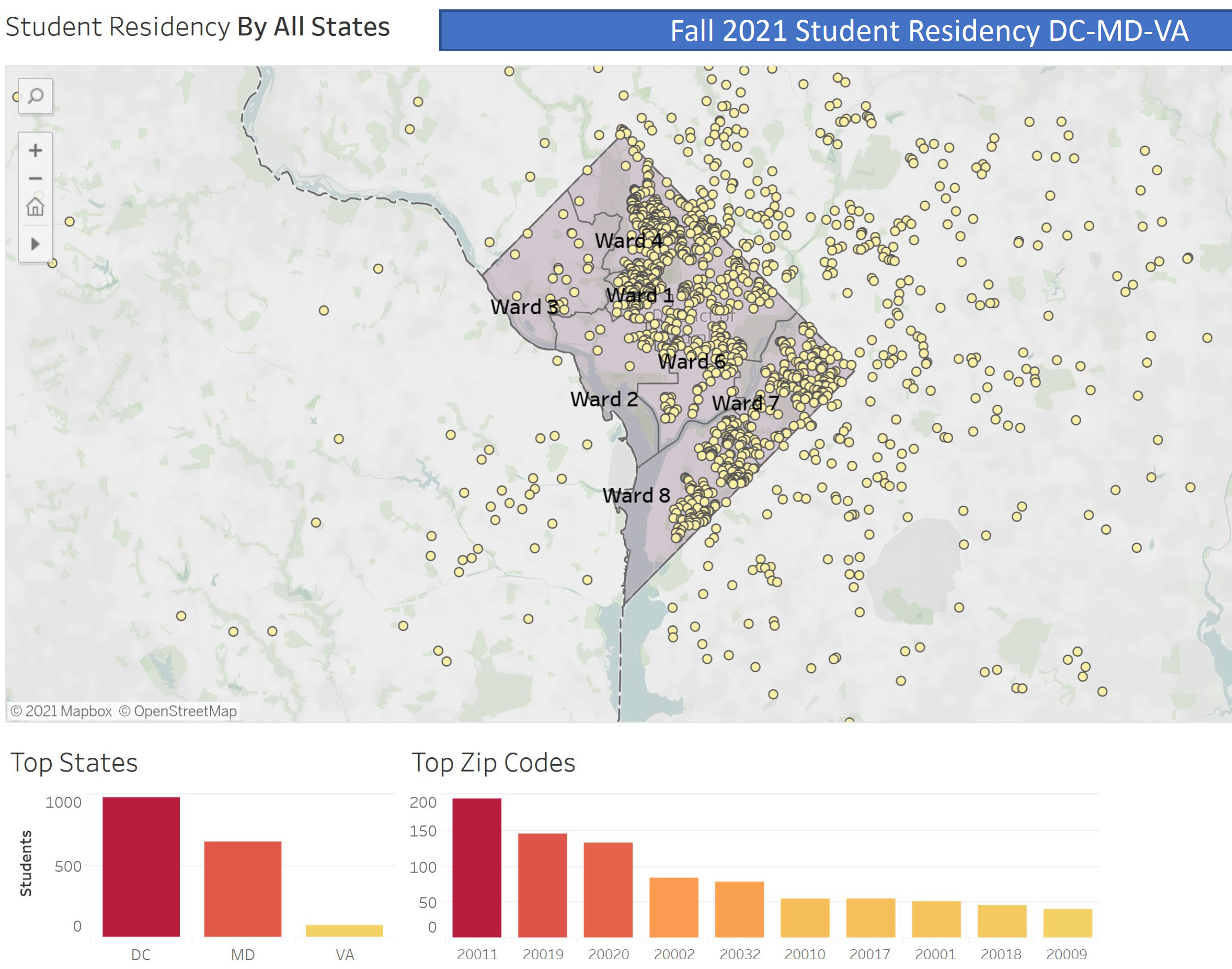
About 51% of all Trinity students are D.C. residents, with another 30% in Maryland, and a much smaller percentage in Virginia. This data informs our thinking about how to manage course schedules, transportation and other services.
We are not finished analyzing the September Community Survey or the Parking and Transportation Survey, but we have enough preliminary data to start working on solutions.
THANK YOU to all who participated — your input is very important, and please know that we read every word!